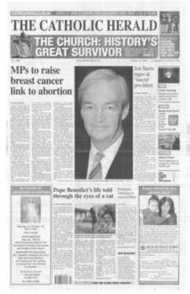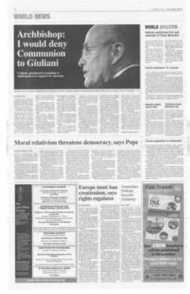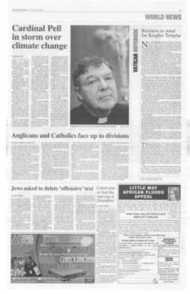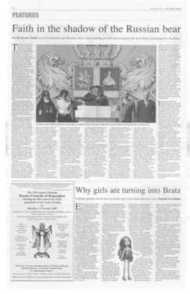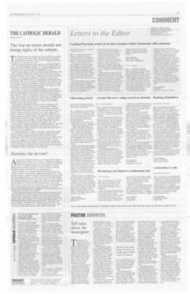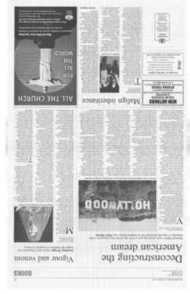Page 4, 12th October 2007
Page 4

Report an error
Noticed an error on this page?If you've noticed an error in this article please click here to report it.
Tags
Share
Related articles
Pope Tells Us Bishops: Secularism Is Threatening...
Beware Of West’s ‘toxic Waste’, Says Pope
Leaders Discuss Terror
A Smiling Benedict Is Welcomed To Australia
Pope Benedict Xvi: The Master-teacher
Moral relativism threatens democracy, says Pope
BY CINDY WOODEN IN ROME
THE FOUNDATION of human rights, democracy, and cooperation among peoples and religions is threatened by a growing assumption that there are no ethical absolutes, Pope Benedict XVI has said.
Not recognising that certain ethical and moral principles are naturally part of being human has "enormous and serious consequences on the civil and social order", Pope Benedict said in a meeting of the International Theological Commission.
Commission members, appointed by the Vatican, have been working on a document on the foundations of natural moral law and, specifically, on how those principles form the basis of a "universal ethic" that can be recognised and shared by all peoples of all religions. "It is not an exclusively or predominantly confessional theme,the Pope said, but is one that is important for all people and for their ability to live together in peace and mutual respect.
He said the commission's report is an important part of a project promoted by the Congregation for the Doctrine of the Faith to encourage universities and academics "to identify useful lines and convergences for a constructive and effective deepening of the doctrine on natural law". The Catholic Church teaches that natural law. the basic norms of which are reflected in the Ten Commandments, is not a set of moral and ethical principles imposed on people by religion, but rights and wrongs that are part of human nature and can be identified by the use of human reason.
Because the principles are "accessible to every rational creature,the Pope said, they are a secure basis for dialogue and cooperation among all peoples and for the building of societies in which human dignity and freedom are protected.
He added that modern societies have lost sight of natural law and too many people were convinced that the majority of a society's citizens are -the ultimate source of civil law".
"Then the problem becomes not the search for what is good, but for power or rather the balance of powers," he said.
"At the root of this tendency lies ethical relativism, which some people even see as one of the principal conditions of democracy because relativism would guarantee tolerance and mutual respect," the Pope said.
However, history has demonstrated repeatedly that the majority can be wrong and that only reason and openness to perennial moral principles can guarantee a just society, he said.
"When the fundamental needs of the dignity of the human person, human life. the institution of the family and equity in the social orderthat is, basic human rights are in play, no man-made law can subvert the norms written by the Creator in human hearts without society itself being dramatically attacked in what constitutes its necessary basis," the Pope said.
Natural law. he said, is "the true guarantee offered to everyone" so they can live in freedom. have their dignity respected and not be manipulated or exploited by the more powerful.
Pope Benedict said "all people of good will" should recognise the natural law as the only certain basis for regulating social life.
blog comments powered by Disqus


